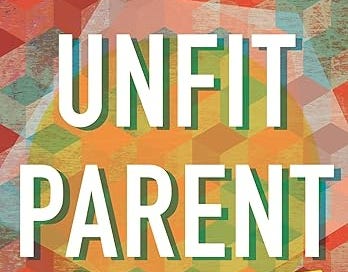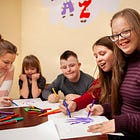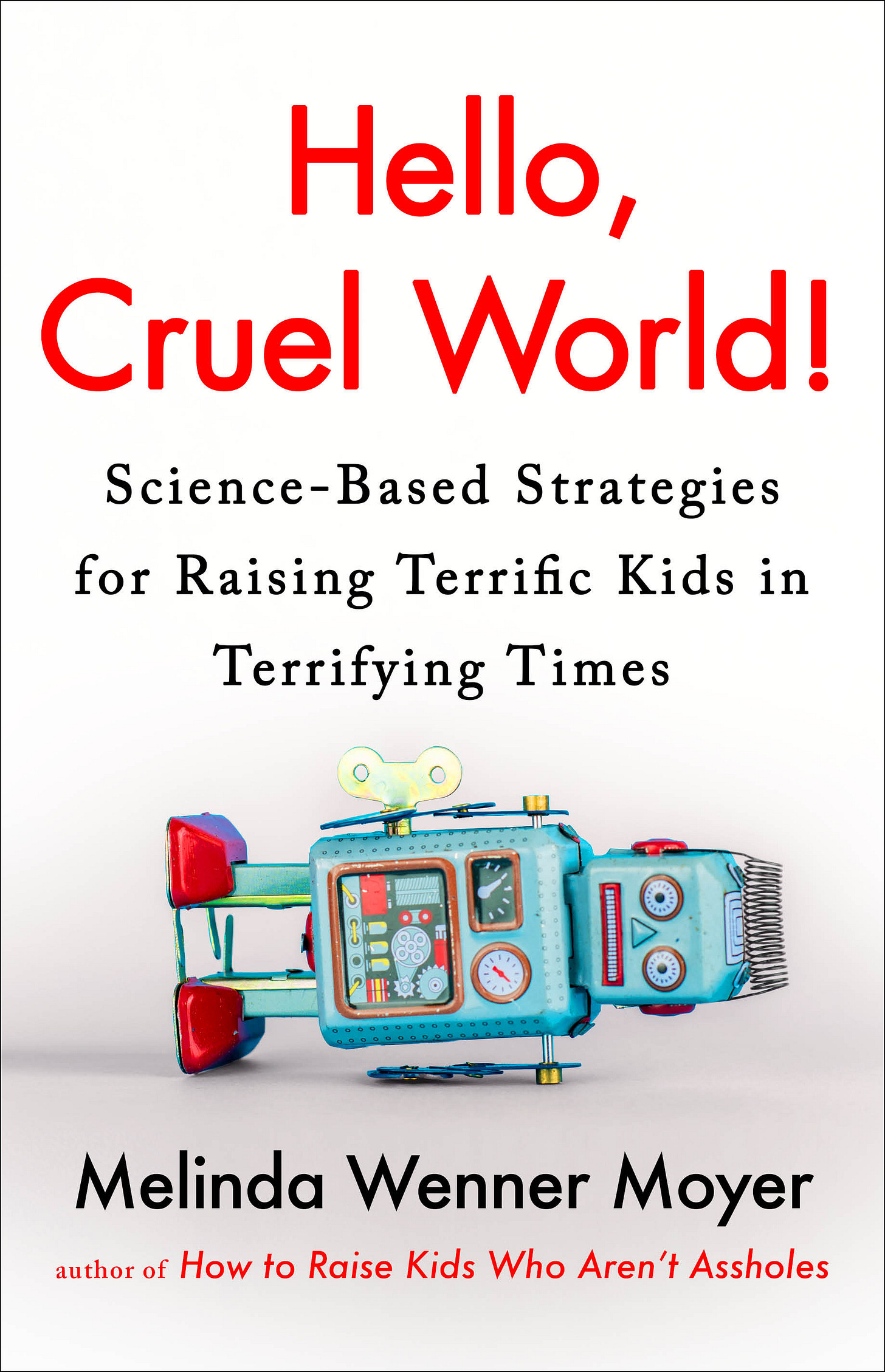"Having a Baby Is a Forced Reckoning with Our Fragility and Need."
A Q&A with author Jessica Slice on what we can all learn from disabled parenting
Today I’m thrilled to be running a Q&A with Jessica Slice, the author of the fantastic new book Unfit Parent: A Disabled Mother Challenges an Inaccessible World. I have about 60 tabs sticking out of various pages of my copy of the book indicating spots that I found particularly incisive and profound; it is a book that changed how I think about motherhood, disability, control, perfectionism, and so much more. (Quite a relevant read, too, in the context of RFK Jr.’s recent dehumanizing and highly ableist comments about autism.) We can learn so much from disabled parents in ways that can help to transform the broader parenting culture.
Before I jump into the Q&A, I want to highlight how Jessica defines disability, because it’s broader and more inclusive than one might expect. She explains that having a firm delineation between disabled and disabled can be unhelpful, and that we can broadly think of disability as “having a body or mind that benefits from the disability justice movement.” A person is disabled, then, if they benefit from accommodations, adaptive equipment, equitable employment, and equitable healthcare. She writes that “disability teaches and reminds us that all bodies need,” a point that I think is incredibly important and profound.
I hope you enjoy our Q&A, but I highly recommend that you read her entire incredible book.
Jessica, what inspired you to write Unfit Parent? Can you tell us a bit about your disability and the experiences that led you to write a book about disabled parenting?
I became disabled at 28, after a hike in Greece led to heat exhaustion, which triggered a latent neurological condition connected to a previously undiagnosed genetic condition. I now spend most of my time in bed or a power wheelchair. My days are very small.
The difference in my life before and after disability is hard to overstate. My life went from shiny and active — my then-husband and I were traveling constantly, often out with friends, and working hard. I was in a perpetual state of striving.
My transition to disability was very difficult. It took years to get a diagnosis, during which my marriage ended, I stopped working, lost friendships, and worried I wouldn’t survive. By the time I became a parent at 34, my view of my body, control, and a good life had transformed.
As a new mom, I found that my experience of parenthood was far different from my friends’ experiences. In some ways, I was more comfortable as a parent than I would have been before my disability. But, I also felt like my parenting was somehow less accredited. My days were so different from what I saw represented in the media, and it made me feel like I wasn’t a real mom. I wrote about that and published the essay in the Washington Post. I heard from over a hundred parents afterward, which shocked me. And so I kept writing. Within two years of writing that essay, I had a book contract to write Unfit Parent.
I love the point you make early on in your book that "if life is harder for a disabled person, we should consider the possibility that it's not our bodies or minds that are to blame, but the social structures that we navigate with those bodies and minds." This idea — to look beyond our so-called failures and consider the role that broader societal structures play in shaping our experiences and our feelings — feels broadly applicable to many parents' (especially mothers'!) experiences with modern, intensive parenting, and the guilt and failure they feel when they aren't able to meet impossible expectations. How do you incorporate this idea into your daily life? Do you have a practice that helps you put things into perspective when you are struggling?
Yes! I think our highly individualistic culture makes us more likely to question ourselves than the system in which we operate. Connecting with other disabled parents has helped me look at my own “shortcomings” differently. But also, we can all ask ourselves: who benefits when we feel like failures? Generally, it’s the people we buy things from in order to compensate.
I also think engaging with disabled moms can help everyone (though, of course, I’m biased). Because we are so thoroughly rejected by the standards of modern, intensive parenting, we can offer a new perspective — one that embraces creativity, community, and acceptance.
In your interviews with parents, you observed that the transition to parenthood seems to be much harder for non-disabled parents than disabled parents. Why do you think this is? What is it about our culture that makes it so that disabled people feel less destabilized by parenting, and what can we learn from this?
These interviews surprised me; in fact, I continued interviewing more and more parents to try to see if this really was a trend. I’ve learned since that research out of Harvard and UCLA supports my observations: generally, disabled parents adjust better to the early days of parenthood than nondisabled parents.
Obviously, the answer isn’t that every parent just needs to become disabled. And it’s not that nondisabled parents are doing anything wrong. I have a few explanations.
The simplest is that the skills required when caring for a newborn overlap with the skills you develop as a disabled person. My disabled body requires the same kind of attentiveness, problem-solving, and flexibility that both of my newborns did.
But, it’s more than that. I think the heart of the issue is that having a baby is a forced reckoning with our fragility and need. We have been taught to fear this kind of dependence (aka disability). Giving birth introduces a temporary state of disability that can feel so profoundly destabilizing in a culture that values physical strength and durability.
Our culture is terrified of disability because we believe that a disabled life is a worse life. So, if you give birth and are suddenly in a body that borders on disabled, it’s natural to be scared. But, disabled people are just as likely to report high levels of life satisfaction as non-disabled people.
In your harrowing chapter on child protective services, you talk about the pervasive societal belief that nuclear families should be autonomous — that "good" parents shouldn't require outside help and support — and that this is used to justify the removal of children from disabled parents. You then propose a thoughtful alternative: That perhaps, instead, we should judge parents by how good they are at marshalling help for the sake of their children. By this metric, disabled parents would be among the best. How do you think we can collectively start to unlearn the "lie of individualism" that tells us we should be able to do everything ourselves, and start to embrace the notion that all parents need help and support?
There are a few forces that perpetuate this lie of individualism. One, of course, is capitalism. We feel (and are) judged on our productivity. Need is not productive. A more critical perspective on consumerism and capitalism would naturally open us up to interdependence.
We must also confront our mortality. It’s my belief that we want so badly to protect our families from pain that we delude ourselves about our own power. Admitting all that we cannot do is admitting all that we cannot prevent. Until we accept our own limited powers, we will remain isolated.
How can non-disabled parents better support disabled parents and create more inclusive and welcoming environments?
I have a few friends who do this beautifully. If we go out, they will let me know the details about the environment we are entering together. For example:
I called ahead, and there is a ramp, but the bathroom is down some stairs. The last time I was there, it was a little warm. Should we meet somewhere else instead?
or
We were exposed to Covid last weekend. No one has symptoms but would you like to reschedule? We are also happy to test and mask.
or
Here’s a video from where you’ll be parking and walking into the backyard. Will you let me know if there is anything I need to move or do to make it more accessible?
Anytime someone takes on some of the planning work, I am so grateful! I spend a lot of time and energy figuring out the logistics of my life as a wheelchair user and having someone else collaborate with me feels like love.
How do you address conversations about your disability — and other disabilities — with your children, and what advice would you give to other parents as they engage in these kinds of discussions?
I do not think being disabled is worse in any way than not being disabled, so I hold that in mind anytime I’m talking to kids about it. I truly believe that our physical and mental diversity is essential and beautiful.
That said, I also want my kids to feel free to express their own frustrations about my limitations. So I try to speak about disability the way I talk about sex (!). I am open, affirming, but leave space for questions and feelings.
I also don’t talk around things (like, I call a penis a penis and a disability a disability). I want us to have a house where needs are not shameful but we can also feel sad about things we want to do and can’t.










This was beautiful!
I hadn't thought about it before but it makes complete sense to me that disabled people would adapt to parenthood more easily for all the reasons mentioned. Expanding on reason #1, I think my disabled friends are very practiced at living in "small worlds" as the author called it-- like if today you don't make it out of the bedroom, it's ok, you are not a failure, and you can try again tomorrow. Speaking only for myself as an able bodied person, living that way with a newborn was a huge shock to me that I wasn't ready for and didn't handle well at all. I wonder if the rough transition to being disabled that she describes was similar.